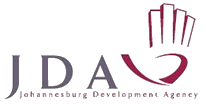“Our new economic democracy is rising”, Finance MMC Geoffrey Makhubo said in his 2016/17 Budget Speech, as he allocated increased budgets to the departments and agencies responsible for implementing the City’s Corridors of Freedom programme.
The Johannesburg Development Agency received an operating budget of R104.5-million for the 2016/17 financial year and a three-year capital budget of R1.2-billion when Finance MMC Geoffrey Makhubo tabled the City’s annual budget on Tuesday, 24 May.
Addressing a packed Turbine Hall in Newtown, MMC Makhubo said the JDA had the primary role of development facilitation on behalf of various city departments, and would continue to implement projects including inner city renewal, BRT infrastructure roll-out and other developments in priority implementation zones.
The JDA’s various projects for 2016/17, he said, included the widening of Alfred Nzo Street and the construction of old age housing and a new pedestrian bridge in Alexandra, the regeneration of the Randburg CBD, and the development of the Orlando East Station Precinct.
R16.1BN FOR ECONOMIC GROWTH CLUSTER
Overall, the operating budget allocation for the Economic Growth Cluster amounted to R4.5-billion for 2016/17, along with a three-year capital budget allocation of R11.6-billion.
This cluster of departments plays a lead role in the implementation of the Corridors of Freedom, the modernisation of the public transport system, the promotion of investments, and SMME support.
The Department of Development Planning – which is part of the cluster, and under which the JDA falls – received an operating budget of R353-million for 2016/17 and a three-year capital budget of R1.5-billion.
This came out of a total budget of R54.8-billion for the City of Joburg for 2016/17, representing an operating budget of R45.3-billion and a capital budget of R9.5-billion.
The Finance MMC noted that the City had more than tripled its capital expenditure, from R3.2-billion in 2011/12 to a record R10.1-billion in 2014/15, while maintaining sustainable debt levels throughout, as evidenced by the three consecutive unqualified audits it had received.
R30BN SPENT ON INFRASTRUCTURE, R70BN TO COME
“Our story is also told by Moody’s Rating Agency in their assessment of Johannesburg in March”, which found that Joburg had “strong revenue growth supported by broad tax base”.
Against this backdrop, the City had been able to embark on a R100-billion capital expenditure roll-out over a decade, as first announced by Executive Mayor Parks Tau in 2012. “By the end of the 2015/16 financial year more than R30-billion of this will have been spent,” MMC Makhubo said.
The 10-year Consolidated Infrastructure Plan investment had enabled the City “to fund service delivery backlogs; to modernise city infrastructure such as roads; and to begin addressing the legacy of apartheid spatial planning through the Corridors of Freedom”.
Investments include new bridges such as the Naledi Bridge, major repairs to the M1, and over 1 600km of roads that have been resurfaced. In addition, over 107km of gravel roads have been upgraded in areas such as Ivory Park, Diepsloot, Doornkop and Braamfischerville.
“We call on private sector investors to partner with us in creating the city to our heart’s desire,” the Finance MMC said. “We are implementing spatial justice in Johannesburg. Our new economic democracy is rising.”

